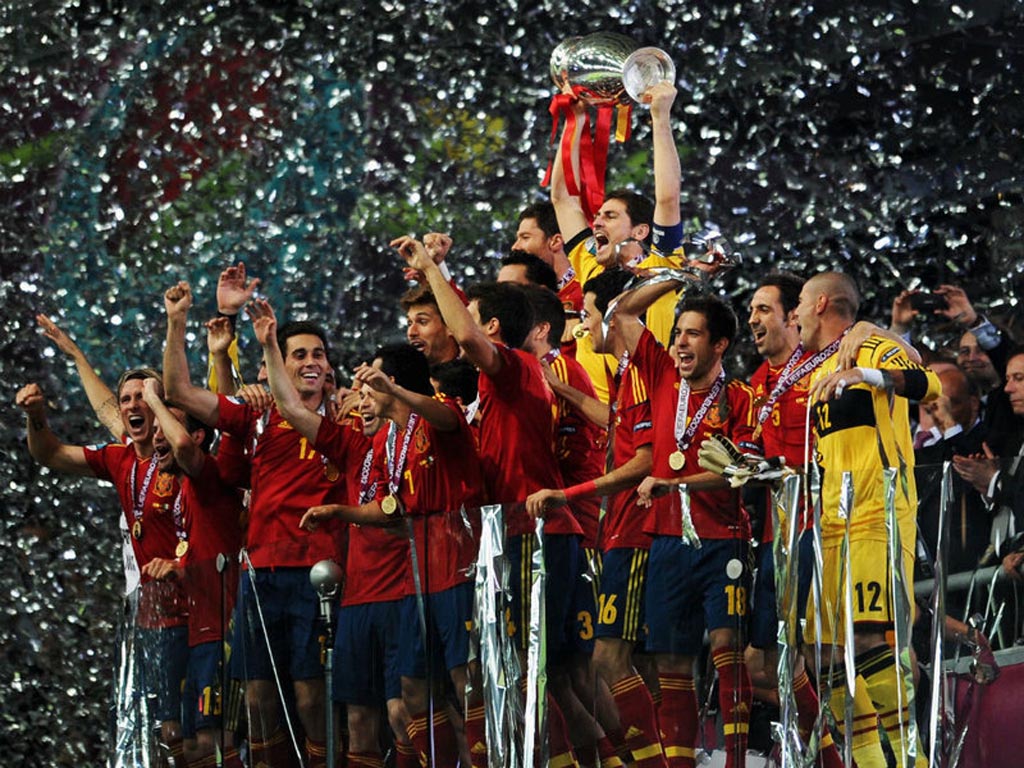
The stunning scoreline of the Euro 2012 Finals was conjured by one of the most magical football squads in history. Spain made a bold statement in a thrilling 90-minute advertisement of how the beautiful game should and could be played–with adept skill, agile movements, bursts of unstoppable pace all combined effectively with pinpoint passing. It was simple and beautiful–golden football which lead to silverware.
Spain made history when they lifted the Henri Delaunay Cup again. Not only is this the first successful defence of a UEFA European Championship, it is also the first three-in-a-row combination of World and Continental titles. Not the West Germans or the Brazilians in the 1970s, nor the France of Zinedine Zidane – in fact, no group of players has managed to endure like this one. The group started winning under Luis Aragones four years ago and has now cemented its status as one of the all-time greatest squads. Spain has also equalled Germany as the only three-time winner of the continent’s greatest prize.
Put simply, Spain found the solutions to the problems they faced–not from the outside but in their players, who rose magnificently to the occasion. Robbed of David Villa, the most prolific striker in Spain’s history, Vicente del Bosque, Cesc Fabregas and Fernando Torres moved on and made up for it. Torres burst into life against the Republic of Ireland, and Fabregas’s role was pivotal in the match against Croatia. A rare Xabi Alonso double dealt with France while Fabregas popped up with the winning penalty in the semi-final against Portugal. Surely the Sergio Ramos-Iker Casillas double act was the climax of the Spain v. Portugal semi-final. One-nil down after Alonso’s spot kick was saved, the man known as San Iker (Saint Iker) in his homeland saved one before Ramos chipped over Rui Patrício in the most outrageous style imaginable!
But Vicente del Bosque’s side saved their best for the last at the UEFA EURO 2012 Finals as they overwhelmed an Italian outfit that simply ran out of steam, recording a 4-0 victory in Kyiv. The nightmare was worse than what the Italian players could have imagined. Casillas was all authority and made some vital interceptions. Jordi Alba was all shimmering class at left-back, defending and raiding in equal measure. Xabi Alonso, in the middle, kept the moves ticking over, sweeping passes over short range and long. Cesc Fabregas delivered one of his most influential displays, his movement mesmerising the Italian defence. The ‘false No. 9’ with No. 10 on his back helped to break the deadlock with Spain’s first goal feeding David Silva 14 minutes into the game for a header in.
Spain’s second was a little too easy, though. Standing on the touch line near halfway, Fabregas headed Iker Casillas’s clearance to Alba who maneuvered the ball into Xavi before dashing forward. The Azzurri back line did not seem to notice but the erudite Xavi did, advancing forward before slotting his new FC Barcelona club-mate in. The composed left-footed finish meant that Alba had struck a sumptuous second. It seemed nothing could deny Spain its first competitive victory over the Azzurri in 92 years– but Italy was not done yet. Antonio Di Natale, scorer in the 1-1 draw between these two teams three weeks ago, came on for Antonio Cassano and could have scored twice within six minutes. His first opportunity was a header, when Riccardo Montolivo’s pass found him in space. He snatched at the chance, but the advancing Casillas blocked the shot.
With six minutes remaining, Fernando Torres and Juan Mata arrived like matadors to finish off their wounded foe. Xavi resumed his conducting, slowing things down before setting Torres up for a goal to add to his UEFA EURO 2008 showpiece effort – a feat no one had managed before. He also worked with Torres to release Mata, just onside, sealing an emphatic win. History was made and the sizeable Spanish contingent in the 63,170 crowd erupted in the light of victory!
Many had written Spain off, stating that it lacked penetration and that too much passing was done among the ageing veteran players. What is more, there were very limited opportunities for reigning European Under-21 champions Juan Mata and Javi Martínez, who have been knocking on the door of the senior squad with none of the elder statesmen particularly disposed to move on. But Jordi Alba, a novice on arrival, performed superbly, crowning off a wonderful tournament with a stunning goal in the final. With Fernando Torres slowly returning to form, the future looks bright, foretelling only Spanish dominance in in the days to come.
My final words shall be those of Del Bosque’s summary of his players’ achievement, “I think it’s very difficult to be champions once, twice is a lot more difficult, and three times is brilliant. I think that these guys have made an extraordinary effort and they have to be congratulated.”


